2023年中考英语复习 第九节 八年级(上) Unit 9~Unit 10课件(共18张PPT)
文档属性
| 名称 | 2023年中考英语复习 第九节 八年级(上) Unit 9~Unit 10课件(共18张PPT) | 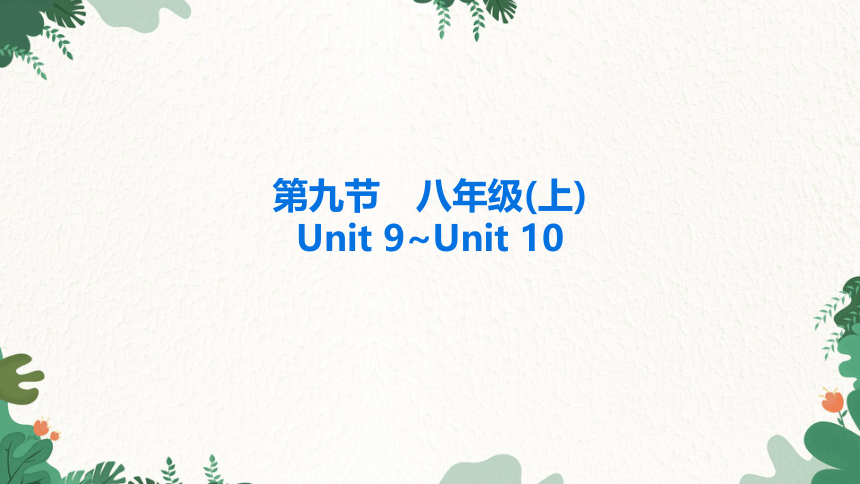 | |
| 格式 | pptx | ||
| 文件大小 | 4.3MB | ||
| 资源类型 | 教案 | ||
| 版本资源 | 人教新目标(Go for it)版 | ||
| 科目 | 英语 | ||
| 更新时间 | 2023-06-11 20:01:39 | ||
图片预览

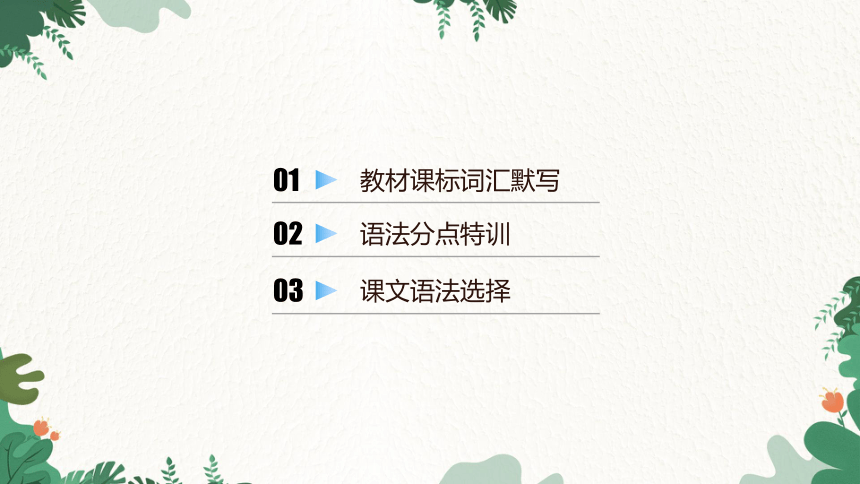
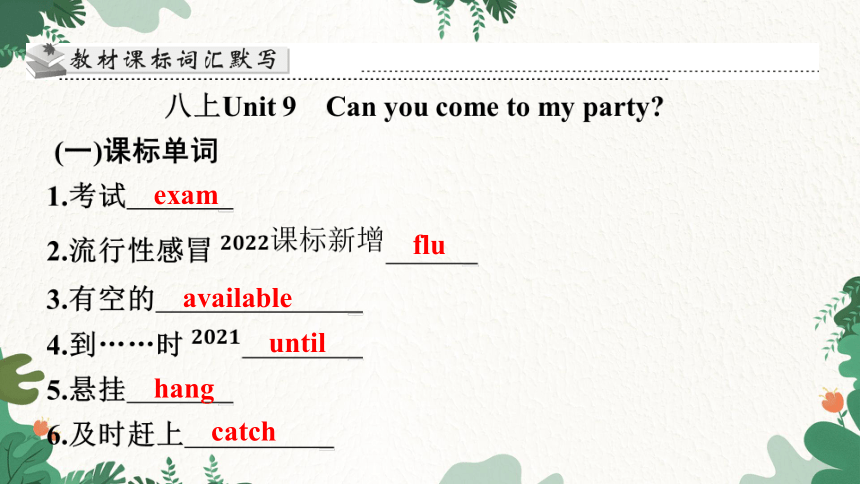
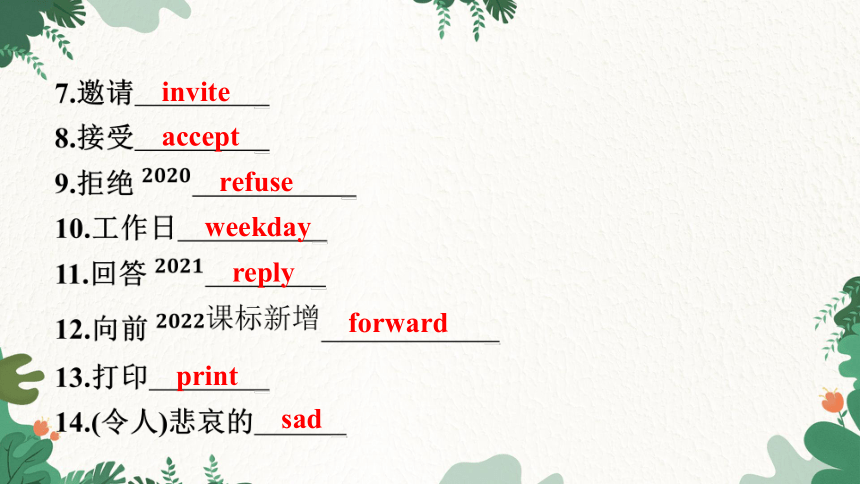
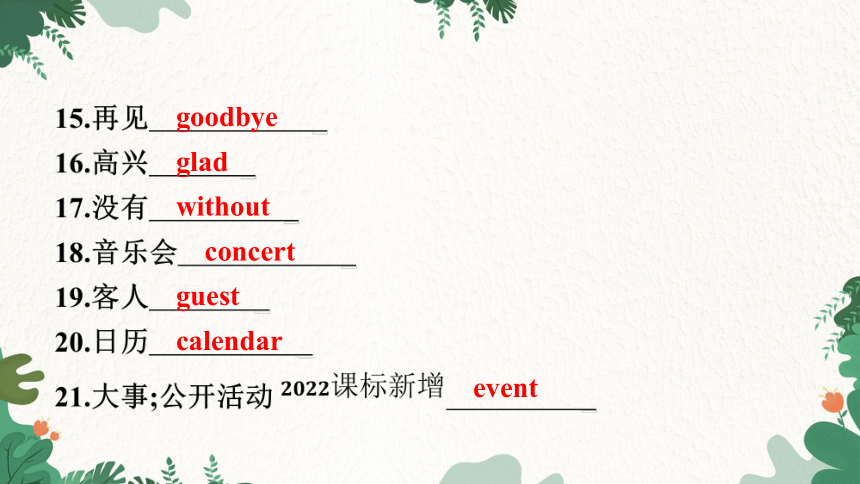
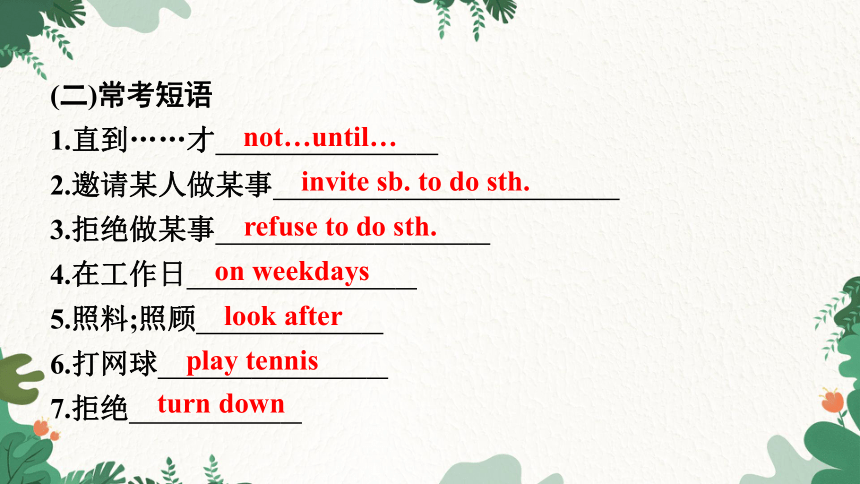
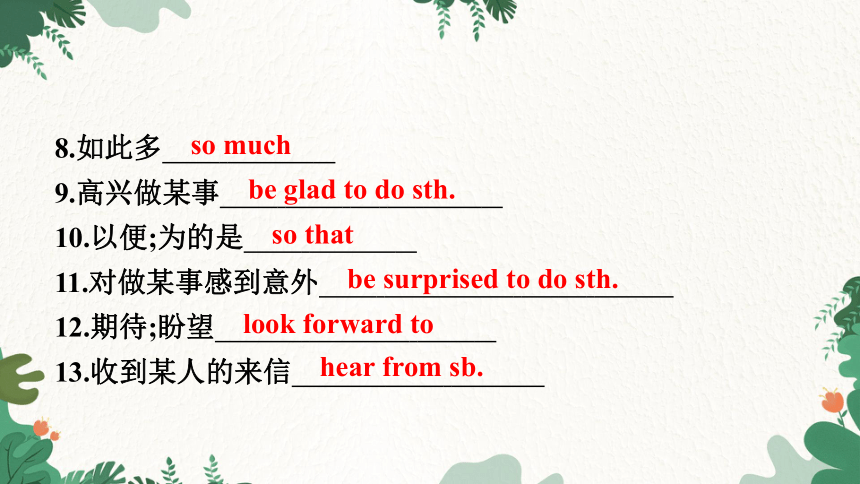
文档简介
(共18张PPT)
第九节 八年级(上)
Unit 9~Unit 10
01
教材课标词汇默写
02
语法分点特训
03
课文语法选择
catch
hang
until
available
flu
exam
sad
print
forward
reply
weekday
refuse
accept
invite
event
calendar
guest
concert
without
glad
goodbye
(二)常考短语
1.直到……才 _
2.邀请某人做某事 _
3.拒绝做某事 _
4.在工作日 _
5.照料;照顾 _
6.打网球 _
7.拒绝 _
turn down
play tennis
look after
on weekdays
refuse to do sth.
invite sb. to do sth.
not…until…
8.如此多 _
9.高兴做某事 _
10.以便;为的是 _
11.对做某事感到意外 _
12.期待;盼望 _
13.收到某人的来信 _
hear from sb.
look forward to
be surprised to do sth.
so that
be glad to do sth.
so much
八上Unit 10 If you go to the party, you’ll have a great time!
(一)课标单词
1.会议 _
2.录像带 _
3.巧克力 _
4.出租汽车 _
5.劝告 _
6.旅行 _
travel
advice
taxi
chocolate
video
meeting
careful
himself
mistake
careless
angry
mile
wallet
unless
normal
16.劝告 _
17.解决 _
18.步骤 _
19.相信 _
20.经验 _
21.别的 _
22.专家 2022课标新增 _
23.组织 2022课标新增_____________________
24.炸薯条 2022课标新增 _
chip
organize (organise)
expert
else
experience
trust
step
solve
advise
(二)常考短语
1.玩得开心 _
2.要求某人做某事 _
3.太……而不能 _
4.乘出租车 _
5.害怕做某事 _
6.逃走;逃跑 _
run away
be afraid to do sth.
take a taxi
too…to…
ask sb. to do sth.
have a great time
1.情态动词can的用法
( )(1)A computer think for itself. It must be told what to do.
A.can’t B.couldn’t C.may not D.might not
( )(2)—Can you go to the supermarket this weekend
— . I have to help my parents with the housework.
A.Sure, I’d love to B.I’m afraid so
C.I’m afraid not D.Sure, I love
C
A
2.if引导的条件状语从句
( )(1)If you to the party, you’ll have a great time.
A.will go B.went C.go D.going
( )(2)I don’t know if it tomorrow. If it ,
I will stay at home.
A.will rain; rains B.rains; will rain
C.will rain; will rain D.rains; rains
A
C
3.情态动词should的用法
( )(1)I’m not feeling well in the stomach.
I so much fried chicken just now.
A.shouldn’t eat B.mustn’t have eaten
C.mustn’t eat D.should eat
( )(2)That young man has made so much noise that he
not have been allowed to attend the concert.
A.could B.must C.would D.should
D
A
Unit 10
Students these days often have a lot of worries. Sometimes they have problems with their schoolwork, and sometimes with their friends. 1 can they do about this Some people believe the worst thing is to do nothing. Laura Mills, a teenager from London, agrees. “Problems and worries are normal in life,” says Laura. “But I think talking to someone helps a lot. 2 we talk to someone, we’ll certainly feel worse.”
Laura once 3 her wallet, and worried for days. She was afraid to tell her parents about it. She even walked three miles to school each day because she didn’t have 4 money. She just kept thinking, “If I 5 my parents, they’ll be angry!” In the end, she talked to her parents and they were really understanding. Her dad said he sometimes made 6 mistakes himself. They got her a new wallet and asked her to be more careful. “I will always remember 7 my problems in the future!” Laura says.
Robert Hunt advises students about common problems. He feels the same way as Laura. “It is best not to run away from our problems. We 8 always try to solve them.” He thinks the first step is to find someone 9 you trust to talk to. This person doesn’t need to be 10 expert like himself. Students often forget that their parents have more experience, and are always there to help them. In English, we say that sharing a problem is like cutting it in half. So you’re halfway to solving a problem just by talking to someone about it!
( )1.A.How B.What C.When
( )2.A.Until B.Though C.Unless
( )3.A.lose B.loses C.lost
( )4.A.some B.any C.no
( )5.A.tell B.will tell C.told
( )6.A.careful B.carefully C.careless
( )7.A.share B.to share C.sharing
( )8.A.can B.have to C.should
( )9.A.which B.what C./
( )10.A.a B.an C.the
B
C
C
B
C
A
B
C
C
B
第九节 八年级(上)
Unit 9~Unit 10
01
教材课标词汇默写
02
语法分点特训
03
课文语法选择
catch
hang
until
available
flu
exam
sad
forward
reply
weekday
refuse
accept
invite
event
calendar
guest
concert
without
glad
goodbye
(二)常考短语
1.直到……才 _
2.邀请某人做某事 _
3.拒绝做某事 _
4.在工作日 _
5.照料;照顾 _
6.打网球 _
7.拒绝 _
turn down
play tennis
look after
on weekdays
refuse to do sth.
invite sb. to do sth.
not…until…
8.如此多 _
9.高兴做某事 _
10.以便;为的是 _
11.对做某事感到意外 _
12.期待;盼望 _
13.收到某人的来信 _
hear from sb.
look forward to
be surprised to do sth.
so that
be glad to do sth.
so much
八上Unit 10 If you go to the party, you’ll have a great time!
(一)课标单词
1.会议 _
2.录像带 _
3.巧克力 _
4.出租汽车 _
5.劝告 _
6.旅行 _
travel
advice
taxi
chocolate
video
meeting
careful
himself
mistake
careless
angry
mile
wallet
unless
normal
16.劝告 _
17.解决 _
18.步骤 _
19.相信 _
20.经验 _
21.别的 _
22.专家 2022课标新增 _
23.组织 2022课标新增_____________________
24.炸薯条 2022课标新增 _
chip
organize (organise)
expert
else
experience
trust
step
solve
advise
(二)常考短语
1.玩得开心 _
2.要求某人做某事 _
3.太……而不能 _
4.乘出租车 _
5.害怕做某事 _
6.逃走;逃跑 _
run away
be afraid to do sth.
take a taxi
too…to…
ask sb. to do sth.
have a great time
1.情态动词can的用法
( )(1)A computer think for itself. It must be told what to do.
A.can’t B.couldn’t C.may not D.might not
( )(2)—Can you go to the supermarket this weekend
— . I have to help my parents with the housework.
A.Sure, I’d love to B.I’m afraid so
C.I’m afraid not D.Sure, I love
C
A
2.if引导的条件状语从句
( )(1)If you to the party, you’ll have a great time.
A.will go B.went C.go D.going
( )(2)I don’t know if it tomorrow. If it ,
I will stay at home.
A.will rain; rains B.rains; will rain
C.will rain; will rain D.rains; rains
A
C
3.情态动词should的用法
( )(1)I’m not feeling well in the stomach.
I so much fried chicken just now.
A.shouldn’t eat B.mustn’t have eaten
C.mustn’t eat D.should eat
( )(2)That young man has made so much noise that he
not have been allowed to attend the concert.
A.could B.must C.would D.should
D
A
Unit 10
Students these days often have a lot of worries. Sometimes they have problems with their schoolwork, and sometimes with their friends. 1 can they do about this Some people believe the worst thing is to do nothing. Laura Mills, a teenager from London, agrees. “Problems and worries are normal in life,” says Laura. “But I think talking to someone helps a lot. 2 we talk to someone, we’ll certainly feel worse.”
Laura once 3 her wallet, and worried for days. She was afraid to tell her parents about it. She even walked three miles to school each day because she didn’t have 4 money. She just kept thinking, “If I 5 my parents, they’ll be angry!” In the end, she talked to her parents and they were really understanding. Her dad said he sometimes made 6 mistakes himself. They got her a new wallet and asked her to be more careful. “I will always remember 7 my problems in the future!” Laura says.
Robert Hunt advises students about common problems. He feels the same way as Laura. “It is best not to run away from our problems. We 8 always try to solve them.” He thinks the first step is to find someone 9 you trust to talk to. This person doesn’t need to be 10 expert like himself. Students often forget that their parents have more experience, and are always there to help them. In English, we say that sharing a problem is like cutting it in half. So you’re halfway to solving a problem just by talking to someone about it!
( )1.A.How B.What C.When
( )2.A.Until B.Though C.Unless
( )3.A.lose B.loses C.lost
( )4.A.some B.any C.no
( )5.A.tell B.will tell C.told
( )6.A.careful B.carefully C.careless
( )7.A.share B.to share C.sharing
( )8.A.can B.have to C.should
( )9.A.which B.what C./
( )10.A.a B.an C.the
B
C
C
B
C
A
B
C
C
B
